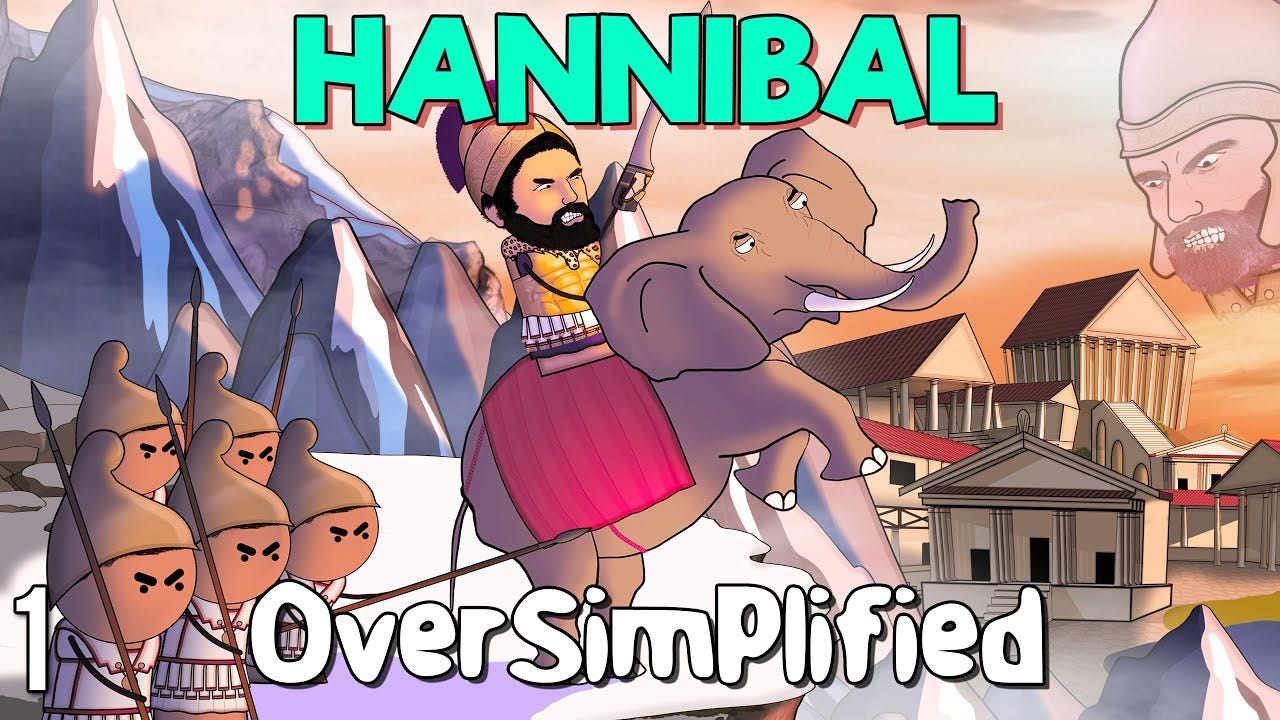Lessons from Hannibal’s Tactical Genius
The Value of Adaptability
I know it’s a cliché, but I really do think about Ancient Rome (and its contemporaries) just about every day. Lately, I’ve been reading (and watching the brilliant OverSimplified video on The Second Punic War) about Hannibal Barca, the great Carthaginian leader.
Known for his audacious crossing of the Alps and his tactical genius, Hannibal's ability to adapt to rapidly changing circumstances made him one of the most formidable opponents Rome ever faced. This adaptability, so crucial in military success, holds invaluable lessons for modern business leaders navigating the unpredictable landscapes of today’s markets.
The Importance of Adaptability
Put simply, adaptability is the ability to adjust to new conditions. In business, this means being able to pivot strategies, embrace new technologies, and respond to changing customer needs and market conditions. Hannibal's entire military career exemplifies adaptability. His ability to adjust his tactics to the circumstances at hand, often turning disadvantages into advantages, provides a blueprint for modern business leaders.
The Crossing of the Alps
One of the most remarkable demonstrations of Hannibal's adaptability was his crossing of the Alps in 218 B.C. Conventional wisdom deemed it impossible for a large army, especially one with elephants, to traverse such a treacherous route. Yet, Hannibal did just that, turning a perceived impossibility into a stunning strategic advantage. This bold move caught the Romans off guard and demonstrated Hannibal's ability to think outside the box and adapt his strategies to achieve his goals.
For business leaders, this translates into the need to challenge conventional wisdom and be willing to take calculated risks. When entering new markets or launching new products, the path may seem daunting. However, by leveraging creativity and a willingness to adapt, leaders can turn potential obstacles into opportunities for success.
Tactical Genius on the Battlefield
Hannibal's adaptability shone brightly in his tactical engagements with the Romans. The Battle of Cannae in 216 B.C. remains a masterclass in military strategy and adaptability. Facing a Roman army nearly twice the size of his own, Hannibal employed a double envelopment maneuver, a tactic that allowed him to surround and decisively defeat the Romans.
This victory was not just about the tactic itself but about Hannibal's ability to read the battlefield and adapt his strategy accordingly. He understood the strengths and weaknesses of both his army and the Roman forces, adjusting his approach to exploit the Romans' vulnerabilities.
In business, this means knowing your competitors and your own company’s strengths and weaknesses. It involves constantly analyzing the market landscape and being ready to shift strategies to outmaneuver competitors. Flexibility in strategy and the ability to execute it effectively are critical components of success.
Learning from Setbacks
Hannibal's career was not without setbacks. Despite his tactical brilliance, he ultimately did not achieve his strategic objective of destroying Rome. However, his ability to adapt was evident in how he managed setbacks and continued to fight effectively in Italy for years after his initial victories.
For business leaders, setbacks are inevitable. What matters is how one responds to them. Adaptability means learning from failures, adjusting strategies, and continuing to pursue goals with renewed vigor. It involves a willingness to pivot and try new approaches when the current strategy isn’t working.
Embracing Change and Innovation
Hannibal was not afraid to innovate. His use of war elephants, although not always successful, showed a willingness to experiment with new methods and technologies. This openness to innovation is crucial in business. Companies that thrive are often those that embrace new technologies and are willing to innovate in their products, services, and processes.
Today, businesses face rapid technological advancements and shifting consumer preferences. Adapting to these changes involves integrating new technologies into operations, exploring innovative business models, and continuously improving products and services to meet evolving customer needs.
The Role of Leadership in Adaptability
Hannibal's leadership was a cornerstone of his adaptability. He inspired loyalty and confidence in his troops, leading by example and making quick, decisive adjustments in response to changing conditions. His leadership style fostered a culture of flexibility and responsiveness within his army.
Business leaders can cultivate adaptability by fostering a similar culture within their organizations. This involves encouraging open communication, empowering employees to make decisions, and promoting a mindset that values flexibility and continuous improvement. Leaders should model adaptability through their actions, showing a willingness to change course when necessary and embracing new ideas and approaches.
Conclusion
Hannibal’s tactical genius and his ability to adapt to changing circumstances offer timeless lessons for modern business leaders. In today’s fast-paced and unpredictable business environment, the ability to pivot, innovate, and respond to setbacks is more critical than ever. By challenging conventional wisdom, learning from failures, embracing change, and fostering a culture of adaptability, business leaders can navigate their companies through the complexities of the modern market landscape and achieve lasting success.
Just as Hannibal’s adaptability allowed him to achieve remarkable feats against formidable opponents, so too can business leaders leverage adaptability to overcome challenges and seize opportunities in their industries. The lessons from Hannibal’s military campaigns serve as a powerful reminder that adaptability is not just a trait but a strategic necessity for success in both war and business.
P.S. “Hannibal Barka” is a great name for a dog. You’re welcome.



